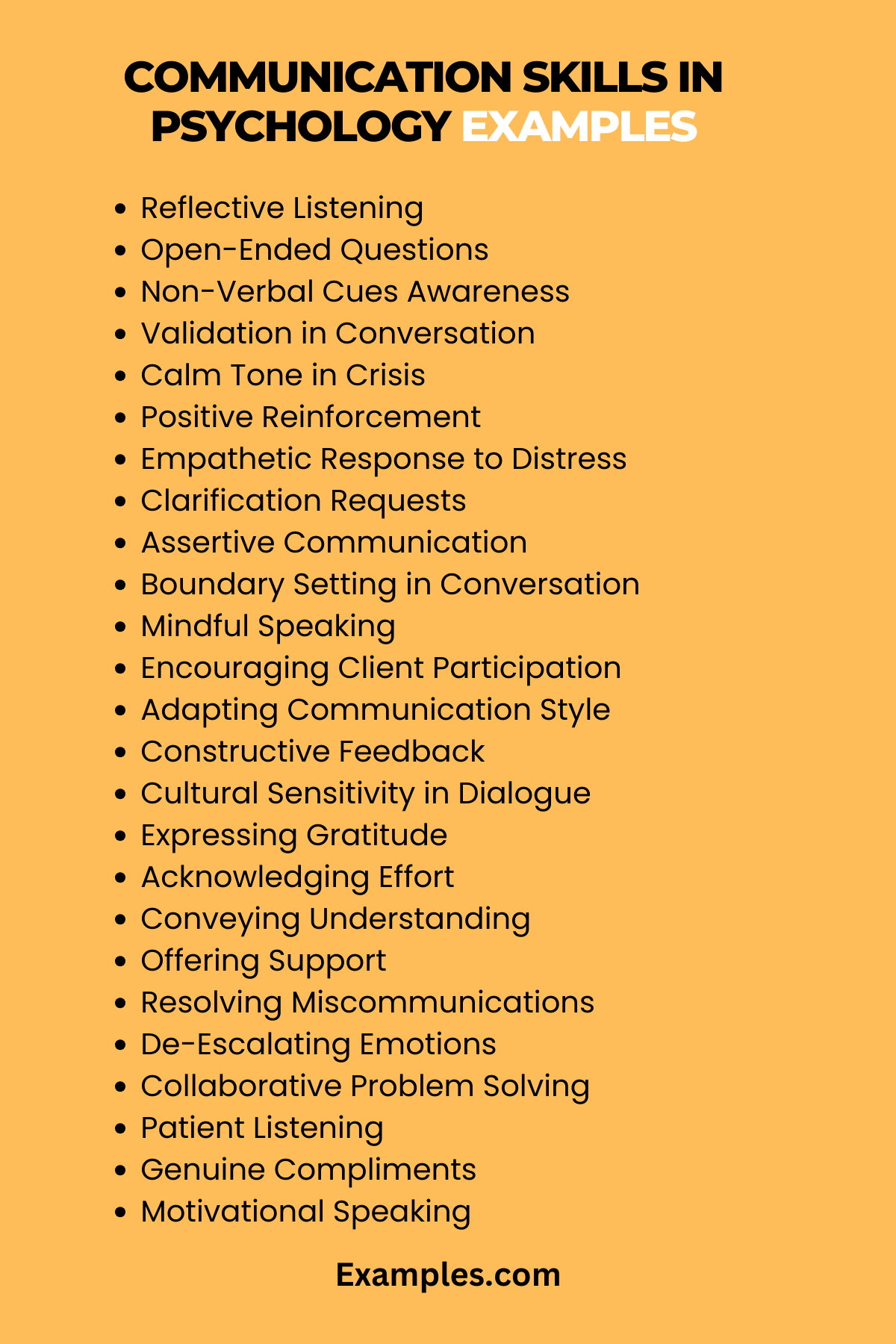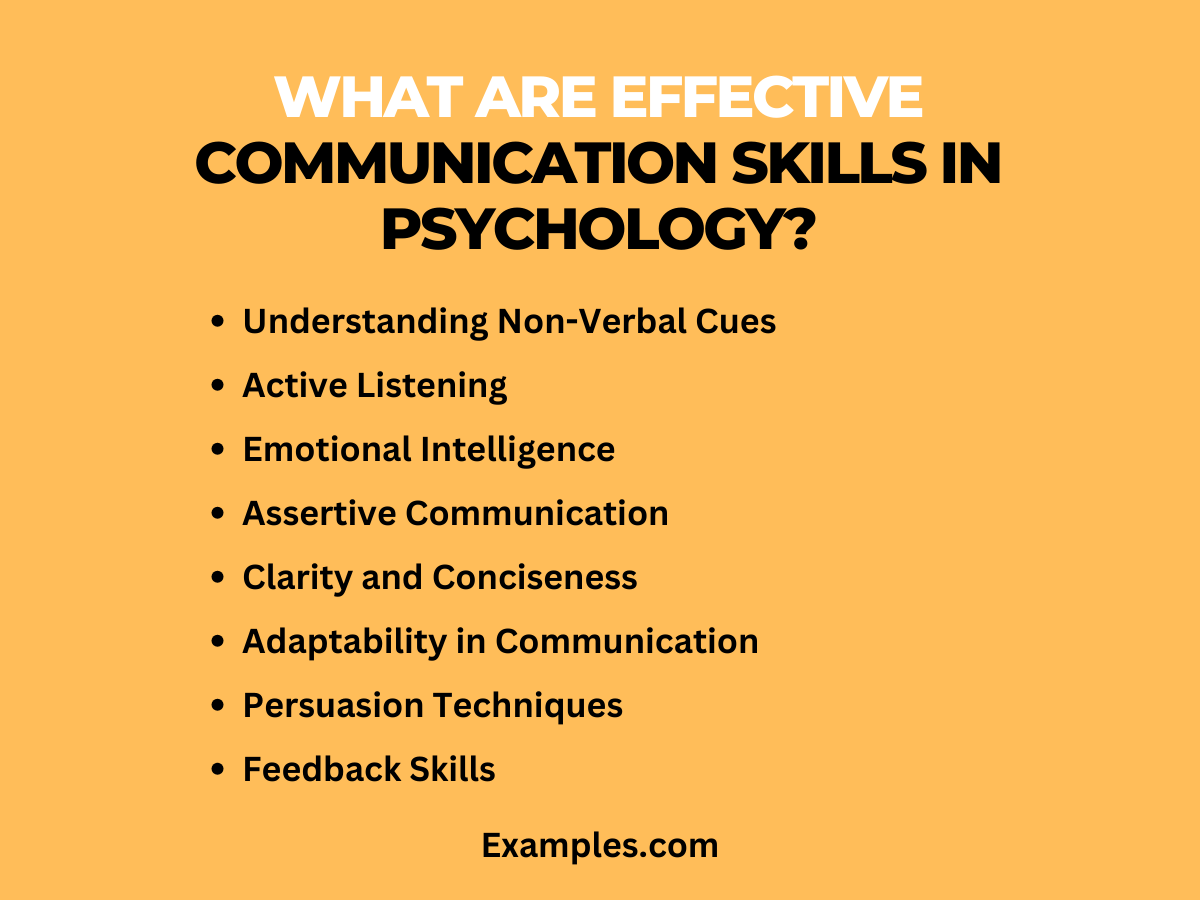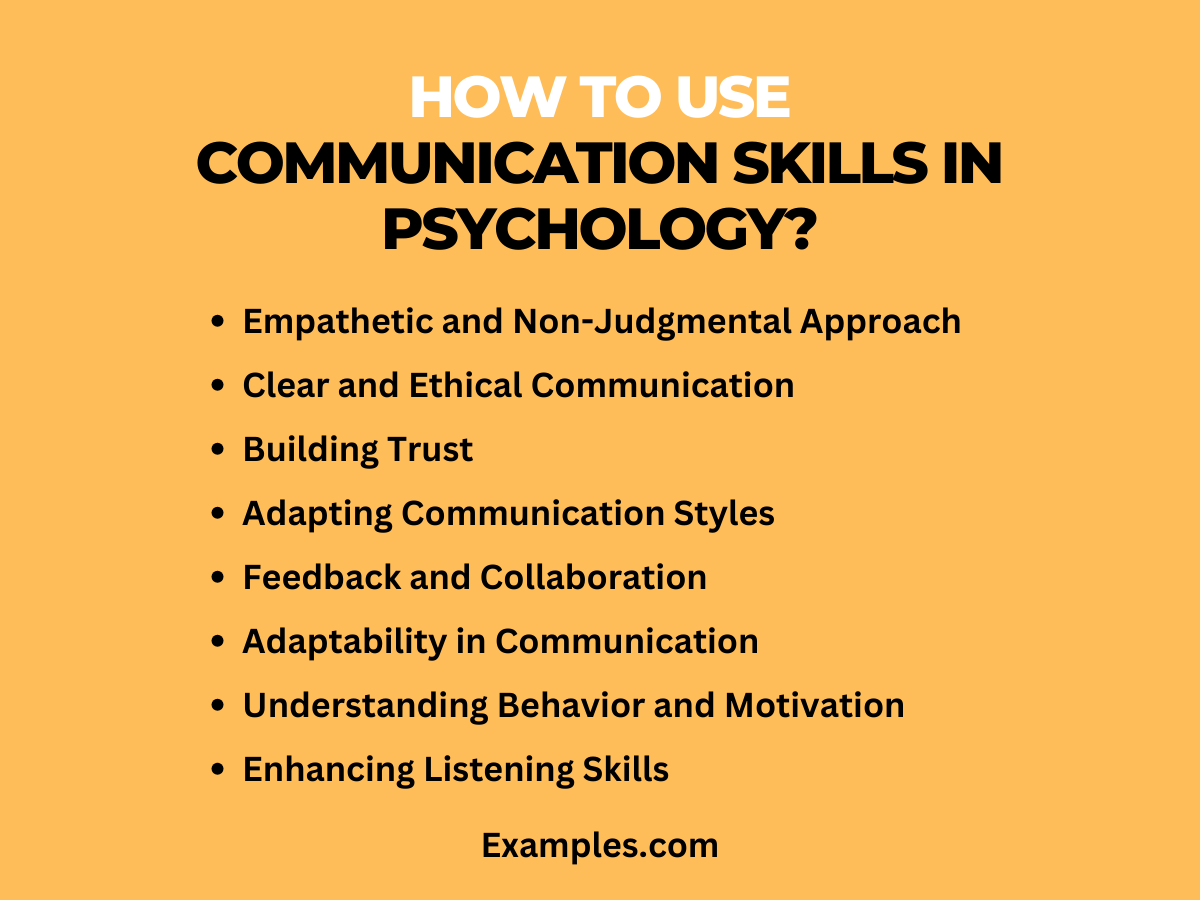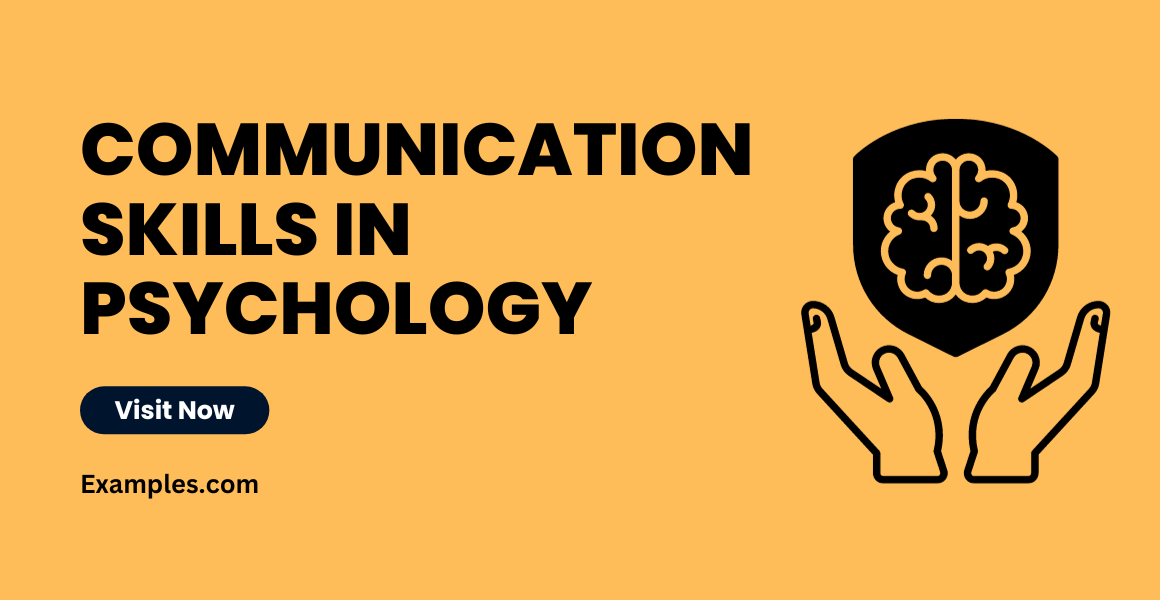Communication Skills in Psychology
Delve into the intricate relationship between psychology and communication with our in-depth guide. Discover how psychological principles enhance communication skills, enabling deeper understanding and more meaningful interactions. Learn to apply psychological insights in various contexts, illustrated through practical communication examples. This guide is an invaluable resource for anyone looking to improve their interpersonal connections, from professionals to students, by harnessing the power of effective communication backed by psychological knowledge.
30 Communication Skills in Psychology Examples
In the fascinating intersection of communication and psychology, there are numerous techniques and approaches that can significantly improve interpersonal interactions. This collection of 30 examples showcases diverse and effective communication methods underpinned by psychological principles. Each example provides practical strategies and sentences for effective communication, focusing on empathy, active listening, and assertiveness. These communication skills are vital for professionals in psychology, as well as anyone interested in enhancing their interpersonal and emotional intelligence.

- Reflective Listening: “It sounds like you’re feeling overwhelmed with work.”
Demonstrates understanding and empathy by mirroring the speaker’s emotions. - Open-Ended Questions: “What are your thoughts on this matter?”
Encourages deeper conversation and understanding. - I-Statements for Conflict Resolution: “I feel concerned when deadlines are missed.”
Expresses personal feelings without blaming others. - Non-Verbal Cues Awareness: Noticing a client’s avoidance of eye contact and gently addressing it.
Shows attentiveness to body language and non-verbal signals. - Validation in Conversation: “Your feelings are completely valid and understandable.”
Acknowledges and validates the speaker’s emotions. - Calm Tone in Crisis: “Let’s take a moment to breathe and talk this through.”
Uses a soothing tone to de-escalate tense situations. - Positive Reinforcement: “You’ve made a lot of progress in expressing your feelings.”
Recognizes and encourages positive behavior changes. - Empathetic Response to Distress: “That sounds like it was a really tough situation for you.”
Offers empathy to someone sharing difficult experiences. - Clarification Requests: “Could you please explain what you mean by that?”
Seeks clarity to avoid misunderstandings. - Assertive Communication: “I would like to discuss my concerns about our current project plan.”
Communicates needs and opinions confidently and respectfully. - Boundary Setting in Conversation: “I’m not comfortable discussing this topic right now.”
Clearly communicates personal limits in a respectful manner. - Mindful Speaking: “I chose my words carefully to avoid misunderstanding.”
Demonstrates thoughtfulness in verbal expression. - Encouraging Client Participation: “I’d love to hear more about your perspective on this.”
Invites clients to share their thoughts and feelings. - Adapting Communication Style: Modifying language and approach based on the client’s age and cognitive level.
Shows adaptability in communication to suit individual needs. - Constructive Feedback: “Here’s what you did well, and here’s how you can improve.”
Provides balanced and constructive feedback. - Cultural Sensitivity in Dialogue: “I want to be respectful of your cultural background while we talk about this.”
Recognizes and respects cultural differences in communication. - Expressing Gratitude: “Thank you for being open and sharing that with me.”
Shows appreciation for honesty and vulnerability. - Acknowledging Effort: “I can see you’re trying hard to make positive changes.”
Acknowledges effort and progress, however small. - Conveying Understanding: “I see where you’re coming from on this issue.”
Communicates understanding of another’s viewpoint. - Offering Support: “I’m here to support you through this process.”
Assures support in challenging times. - Resolving Miscommunications: “Let’s revisit what was said to clear up any misunderstandings.”
Addresses and resolves miscommunications effectively. - De-Escalating Emotions: “Let’s take a step back and approach this calmly.”
Helps in calming down heated or emotional situations. - Collaborative Problem Solving: “What solutions can we come up with together?”
Encourages joint effort in finding solutions. - Patient Listening: “Take your time, I’m here to listen to everything you have to say.”
Demonstrates patience and attentiveness in listening. - Genuine Compliments: “Your insight on this topic is really valuable.”
Gives sincere and specific compliments. - Expressing Concern: “I’m concerned about your wellbeing in this situation.”
Shows care and concern for others. - Motivational Speaking: “You have the strength to face these challenges.”
Encourages and motivates individuals during difficult times. - Empathy in Group Settings: “I think many of us can relate to what you’re sharing.”
Builds empathy and connection in group discussions. - Asking for Feedback: “I’d appreciate your thoughts on how our sessions are going.”
Seeks feedback for continuous improvement. - Neutral Language in Difficult Discussions: “Let’s discuss this matter objectively to find the best solution.”
Uses neutral language to maintain objectivity in sensitive discussions.
What are Effective Communication Skills in Psychology?
In the world of psychology, effective communication skills are vital for fostering understanding, empathy, and positive relationships in both personal and professional settings. These skills are more than just speaking and listening; they involve a deeper understanding of human behavior and emotional intelligence.

Here’s a closer look at what constitutes effective communication from a psychological perspective.
Understanding Non-Verbal Cues
- Body Language Interpretation: The ability to read and interpret body language, facial expressions, and posture.
- Expressive Non-Verbal Communication: Conveying feelings and reactions through non-verbal behaviors effectively.
Active Listening
- Empathetic Listening: Truly hearing and understanding what the other person is saying, beyond just the words.
- Reflective Listening: Mirroring back what you have heard to show comprehension and empathy.
Emotional Intelligence
- Self-Awareness: Recognizing your own emotions and how they influence your communication.
- Empathy for Others: Understanding and sharing the feelings of others, a crucial element in building rapport.
Assertive Communication
- Balancing Assertiveness and Empathy: Expressing your needs and opinions clearly and respectfully, without overriding the feelings of others.
- Conflict Resolution: Using assertiveness to manage and resolve conflicts effectively.
Clarity and Conciseness
- Clear Messaging: Conveying your message in a straightforward and unambiguous manner.
- Brevity in Communication: Keeping your communication concise and to the point, avoiding unnecessary details.
Adaptability in Communication
- Flexibility in Approach: Adjusting your communication style to suit different situations and audiences.
- Cultural Sensitivity: Being aware of and adapting to cultural differences in communication styles.
Persuasion Techniques
- Influencing Skills: Using psychological principles to persuade and influence others positively.
- Ethical Persuasion: Balancing persuasive communication with ethical considerations and respect for the listener.
Feedback Skills
- Constructive Feedback: Providing feedback in a way that is helpful and encourages growth.
- Receiving Feedback: Accepting and learning from feedback, a critical component of personal development.
Incorporating these effective communication skills, grounded in psychological principles, can lead to more meaningful interactions and relationships, both personally and professionally. Understanding and applying these skills is crucial for anyone looking to enhance their communication abilities in diverse environments.
Why is Communication Important in Psychology?
In the realm of psychology, communication is pivotal for numerous reasons. It serves as the foundation for understanding human behavior and mental processes. Effective communication facilitates better therapist-client relationships, enabling psychologists to understand their clients’ issues more deeply. It is crucial in conveying empathy, building trust, and creating a safe space for clients to express themselves. Moreover, communication skills are essential in interpreting non-verbal cues and emotional states, which are significant in psychological assessments and therapies.
Functions of Communication Skills in Psychology
Communication skills in psychology serve several key functions:
Facilitating Understanding and Empathy
- Empathetic Engagement: Communication skills help psychologists empathize with their clients, fostering a deeper understanding of their experiences and perspectives.
- Building Rapport: Effective communication is instrumental in building rapport, a cornerstone of successful therapeutic relationships.
Enhancing Therapeutic Effectiveness
- Conveying Psychological Concepts: Psychologists use communication to explain complex psychological concepts in an understandable manner.
- Therapeutic Interventions: Communication is vital in delivering various therapeutic interventions and ensuring their effectiveness.
Supporting Mental Health Treatment
- Treatment Planning: Clear communication aids in developing and conveying treatment plans tailored to individual clients.
- Client Involvement: Encouraging clients to actively participate in their treatment process through open dialogue.
Improving Interpersonal Relationships
- Modeling Healthy Communication: Psychologists often model healthy communication practices for clients, helping them improve their interpersonal relationships.
- Conflict Resolution: Teaching and applying communication skills is essential in resolving conflicts, both in therapy and in clients’ personal lives.
In essence, communication skills in psychology are not just tools for information exchange but are fundamental in understanding, treating, and improving the mental well-being of individuals. These skills are integral in every aspect of psychological practice, from initial assessments to the conclusion of therapy.
How Does Psychology Improve Communication Skills?
Psychology plays a crucial role in enhancing communication skills by providing insights into human behavior and thought processes. Understanding psychological concepts can lead to more effective and empathetic interactions, both personally and professionally.
Understanding Behavior and Motivation
- Behavior Analysis: Psychology helps in understanding why people behave the way they do, allowing for tailored communication strategies.
- Motivational Insight: Knowing what motivates individuals can guide the approach and tone in conversations.
Emotional Intelligence
- Empathy Development: Psychology emphasizes the importance of empathy, enabling individuals to understand and respond to the emotions of others effectively.
- Self-awareness: Being aware of one’s emotions and triggers helps in managing responses and interactions.
Building Stronger Relationships
- Interpersonal Skills: Psychological principles teach effective ways to build and maintain relationships.
- Conflict Resolution: Understanding different perspectives and emotional responses aids in resolving conflicts amicably.
Enhancing Listening Skills
- Active Listening: Psychology encourages active listening, ensuring that the communicator feels heard and understood.
- Non-Verbal Cues: Interpreting body language and facial expressions to gain a deeper understanding of the message.
By integrating psychological insights, communication becomes more than just an exchange of words; it becomes an opportunity for connection and understanding.
How to Use Communication Skills in Psychology?
Applying communication skills effectively in the field of psychology is vital for professionals in counseling, therapy, and other related areas.

Empathetic and Non-Judgmental Approach
- Empathetic Responses: Show genuine understanding and empathy towards clients’ experiences.
- Non-Judgmental Listening: Create a safe space where clients feel comfortable sharing without fear of judgment.
Clear and Ethical Communication
- Ethical Boundaries: Maintain clear and ethical communication, respecting confidentiality and professional boundaries.
- Clarity in Explanation: Explain psychological concepts and treatment plans in an understandable manner.
Building Trust
- Consistency: Be consistent in interactions to build trust with clients.
- Authenticity: Genuine, authentic communication fosters a stronger therapist-client relationship.
Adapting Communication Styles
- Tailored Communication: Adapt communication style to meet the individual needs of different clients.
- Cultural Sensitivity: Be aware of and sensitive to cultural differences in communication styles.
Feedback and Collaboration
- Collaborative Dialogue: Engage in a two-way dialogue, allowing clients to be active participants in their therapy.
- Constructive Feedback: Provide feedback that supports clients’ growth and development.
Incorporating these communication skills in psychology facilitates effective therapy, counseling, and support, ensuring that clients receive the best possible care and guidance.
In conclusion, the integration of communication skills with psychological principles offers profound benefits in understanding, empathy, and effective interaction. By applying these insights, individuals can achieve greater clarity, stronger relationships, and more meaningful connections. Whether in professional settings or personal life, these skills are invaluable for fostering deeper understanding and facilitating positive change, making them essential tools in the realm of psychology.



